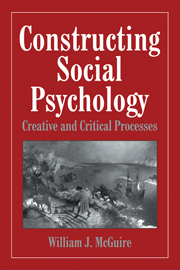Book contents
- Frontmatter
- Contents
- List of Tables and Figures
- Foreword
- 1 Learning My Way
- 2 Immunization against Persuasion
- 3 Attitude-Change Studies
- 4 Integrative Reviews of Social Influence Processes
- 5 Developing Effective Persuasion Campaigns
- 6 Thought Systems: Their Content, Structure, and Functioning
- 7 A Topography of the Phenomenal Self
- 8 Distinctiveness Theory and the Salience of Self-characteristics
- 9 Language and Thought Asymmetries
- 10 Psychology and History
- 11 Winters of Our Discontents: Crises in Social Psychology
- 12 A Perspectivist Epistemology: Knowledge as Misrepresentation
- Selected References
- Index
9 - Language and Thought Asymmetries
Published online by Cambridge University Press: 05 October 2013
- Frontmatter
- Contents
- List of Tables and Figures
- Foreword
- 1 Learning My Way
- 2 Immunization against Persuasion
- 3 Attitude-Change Studies
- 4 Integrative Reviews of Social Influence Processes
- 5 Developing Effective Persuasion Campaigns
- 6 Thought Systems: Their Content, Structure, and Functioning
- 7 A Topography of the Phenomenal Self
- 8 Distinctiveness Theory and the Salience of Self-characteristics
- 9 Language and Thought Asymmetries
- 10 Psychology and History
- 11 Winters of Our Discontents: Crises in Social Psychology
- 12 A Perspectivist Epistemology: Knowledge as Misrepresentation
- Selected References
- Index
Summary
Two of our lines of research on asymmetries in thought and language will be reported here: first our work on positivity biases in thinking (McGuire & McGuire, 1992c), which grew out of our earlier research (McGuire & McGuire, 1991a) on the phenomenal self (chapter 7) and on thought systems (chapter 6); and then our more autonomous line of asymmetry research on seemingly arbitrary word-order asymmetries (McGuire & McGuire, 1992b).
COGNITIVE AND AFFECTIVE POSITIVITY ASYMMETRIES IN THOUGHT SYSTEMS
[Adapted with permission from W. J. McGuire & C. V. McGuire, 1992c, Cognitive-versus-affective positivity asymmetries in thought systems, European Journal of Social Psychology, 22, pp. 571-591. Copyright © 1992 by John Wiley & Sons Ltd. See also McGuire & McGuire, 1996b.]
Psychologists and people in general use the terms positive and negative ambiguously to refer to both cognitive and affective dimensions. One can study positive versus negative thinking about a person in the cognitive sense of what the person has versus what he or she lacks, what he or she is versus what he or she is not. The participant can be asked, “List all the characteristics that your best friend has (or that France has, or that democracy has)” versus “List all the characteristics that your best friend (or France, or democracy) does not have.” Quite independently, one can study positive versus negative thinking in the affective, desirable versus undesirable, sense of thinking about good versus bad characteristics of the topic. The participant can be asked, “List all the desirable characteristics that your best friend (or France, or democracy) has” versus “List all the undesirable characteristics that your best friend (or France or democracy) has.”
- Type
- Chapter
- Information
- Constructing Social PsychologyCreative and Critical Aspects, pp. 294 - 322Publisher: Cambridge University PressPrint publication year: 1999



